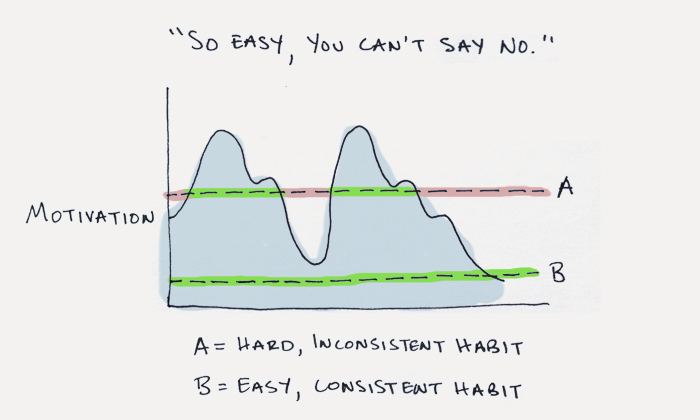Developing a new habit can be an enjoyable and insightful journey, like stepping into an unexplored world full of discovery and potential. We experiment with various strategies, think critically, and even come up with creative ideas. But despite our best intentions, failure often finds its way into the process, knocking at our door. In such moments, it’s easy to feel discouraged and consider giving up.
But have you ever stopped to reflect on why you failed to execute your plan? Sometimes, failure stems not from lack of effort but from using an ineffective or poorly designed strategy. In this guide, we’ll explore how to avoid such pitfalls, starting with a key concept from “Atomic Habits” by James Clear: “Start Small and Think in Atoms”.

Strategy 1: Start Small and Think in Atoms
Often, we overlook or underestimate the power of small habits. Do you realize how much these seemingly insignificant actions can help in developing new habits? James Clear emphasizes starting with small habits, which he calls “atomic habits” because they are tiny, manageable actions that are easy to sustain and implement.
Why does Clear emphasize “atomic habits”? These small actions are simple but powerful. They build momentum, and when performed consistently, they lead to massive improvements over time. For example, if your goal is to read more, start by reading just one page a day. While this might seem too small to matter, it lowers the barrier to entry and creates a routine that you can gradually build on.
Clear highlights that “Habits are the compound interest of self-improvement”. Just like financial investments, small efforts, when compounded daily, yield significant growth over time. He suggests aiming to get just 1% better every day—an approach that leads to remarkable long-term results.
Focusing on Systems, Not Just Goals
One of the most important ideas in “Atomic Habits” is the shift from focusing on achieving specific goals to becoming a person who consistently practices the behaviors that lead to success. For instance, instead of saying, “I want to run,” start thinking, “I am a runner.” This change in mindset transforms how you approach your habits and creates a lasting identity shift, which in turn drives long-term success.
Making Habit-Building Manageable and Fun
Building new habits doesn’t need to be a daunting or overwhelming task. Instead of feeling discouraged by big, lofty goals, focus on the small, daily actions that can propel you toward your desired outcome. It’s about finding joy in the process rather than obsessing over the result. The key is to make the habit easy enough to sustain consistently.
For example, if you want to get into the habit of exercising, start with just five minutes a day. Once you’ve built the habit, you can gradually extend the time. This strategy helps you avoid the common pitfall of overcommitting and burning out.
Overcoming Failure with Atomic Habits
Failure is a part of every journey, but that doesn’t mean you’re destined to give up. Sometimes, failure is simply a sign that your strategy needs adjustment. If you encounter setbacks, reflect on the process rather than blaming yourself. Could the habit be too big or complex? Are there ways to make it more manageable?
By embracing small, atomic changes, you can avoid feeling overwhelmed and discouraged, ultimately leading to long-lasting personal growth.

Conclusion: The Power of Atomic Habits
Atomic habits may seem insignificant on the surface, but their power lies in their simplicity and consistency. By starting small, focusing on daily improvements, and embracing an identity shift, you can create meaningful, long-term change in your life. The journey of self-improvement becomes sustainable and even enjoyable when you prioritize these tiny, effective habits.
Remember, the goal isn’t just to achieve something; it’s to become the kind of person who naturally engages in the behaviors that lead to success. In the end, it’s not about perfection—it’s about progress, one tiny step at a time.